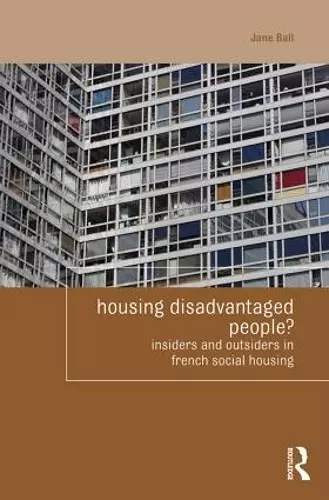Housing Disadvantaged People?
Insiders and Outsiders in French Social Housing
Format:Paperback
Publisher:Taylor & Francis Ltd
Published:28th Sep '11
Currently unavailable, and unfortunately no date known when it will be back
This paperback is available in another edition too:
- Hardback£180.00(9780415554442)

Social housing appears to offer a solution for the housing of poor and disadvantaged people. The French "right to housing" offers poor and disadvantaged citizens priority in social housing allocation, and even a legal action against the State to obtain a social home. Despite this, France is suffering a long-lasting housing crisis with disadvantaged people having particular difficulties of access, often despite the efforts of local housing actors. This situation is affected by the European Court of Human Rights and EU decisions limiting diverse national housing and rental policies.
Between historic French revolutions and the modern riots, negotiated solutions to social dilemmas emerged. Despite progress in constitutional principles, complex local negotiations still ultimately determine who is housed. Local social landlords, mayors and employee and tenant representatives use their privileges to house their insiders: existing tenants, locals and employees, with rent insufficiently subsidized. ‘Insider Outsider’ theory is used for an economic analysis of exclusion in social housing allocation: its processes, institutional context, and stigmatizing effects. This highlights the spatial effects of nimbyism, excluding disadvantaged outsiders, and concentrating them in deprived areas. Simultaneously, urban regeneration reduced affordable housing stock and ‘social mix’ became a reason to refuse a social home.
History, comparative law, economic theory and local interviews with housing actors give a detailed picture of what happens in and around French social housing allocation for an interdisciplinary housing policy audience. Constitutional principles appear in an unfamiliar guise as negotiating positions, with the "right to property" supporting landlords and the "right to housing" supporting tenants. French debates about the function of social landlords are echoed across Europe and reflected in European policies concerning rights, and the exclusion of disadvantaged minorities.
"The book contains a wealth of information on French housing policies and actors that has not been published in the English language before. Consequently, even though it was not written with this aim, the book provides a good introduction to the French system of social housing. Furthermore, Ball’s consistent application of insider–outsider theory to the field of housing certainly is innovative, and may inspire other researchers to follow her example." -Joris Hoekstra, Delft University of Technology, The Netherlands, International Journal of Housing Policy
"...this is a carefully put together book that provides a wealth of detail on a subject that is of specific interest within France, but which also discusses concerns that are of direct relevance to several EU member states. The book is recommended for anyone with an interest in social housing allocation and the barriers to social housing that exist for some groups who are in situations of housing exclusion and homelessness." - European Journal of Homelessness
"Earlier work had failed to identify the strong effects of local divergence in allocation practice due to restricted research parameters. In this respect Housing Disadvantaged People? has changed the parameters for future research irreversibly. The book will be indispensible for anyone wanting to think seriously about social housing in a European context, and of real benefit to any researcher who embarks upon comparative studies in law and administration." - Nottingham Law Journal
ISBN: 9780415554459
Dimensions: unknown
Weight: 670g
360 pages